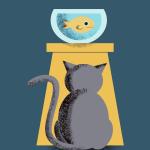Adam was given the power to name things; that is, he, as well as human beings after him, could devise a word to signify some reality. Thus we have language. Learning a new word can make us aware of truths and feelings that we otherwise might have missed.
Some languages have words for things that others don’t. These “untranslatable words” often name things that need naming. For example, the Yiddish word “kvell” means ““to glow with pride and happiness at the success of others (often family members).'” The Georgian word “shemomedjamo” means eating even though you are full because it tastes so good. The German “Fernweh” means feeling homesick for a place you’ve never been to. The German “Verschlimmbessern” means making something worse by trying to improve it.
We should start using some of these and thus bring them into English. After the jump, links to these and lots more.
From Bill Sones and Rich Sones, Strange but true | News OK:
Q: Drawing on some practically untranslatable words from the world’s languages, what are a few that might be welcome additions to English?
A: Let’s start with the Yiddish word “kvell,” meaning “to glow with pride and happiness at the success of others (often family members),” says Steve Mirsky in Scientific American magazine, citing psychologist Tim Lomas’ cross-cultural linguistics study for the Journal of Positive Psychology. Other languages lack a single word to express this idea.
Have you ever felt so excited about waiting for someone that you keep going outside to check if they’ve arrived? There’s an Eskimo Inuit word for that: “iktsuarpok.” As Lomas explains, the value of “untranslatable” words is that they may give voice to hitherto unlabeled experiences. Consider the Georgian word “shemomedjamo” for continuing to eat even when full because it was just so enjoyable; or “utepils” in Norwegian for drinking beer outside on a hot day; or the Portuguese “desbundar” for becoming uninhibited while having fun. “Bantu’s even more specific ‘mbukimvuki’ involves whipping off your clothes to dance,” Mirsky adds. “Hey, it’s tough to dance in tight pants.”
And one of Mirsky’s favorite experiences, now named, is the Swedish “gokotta” for “waking up early to go outside to hear the morning’s first birds sing.”
The Scientific American article referred to is here.















